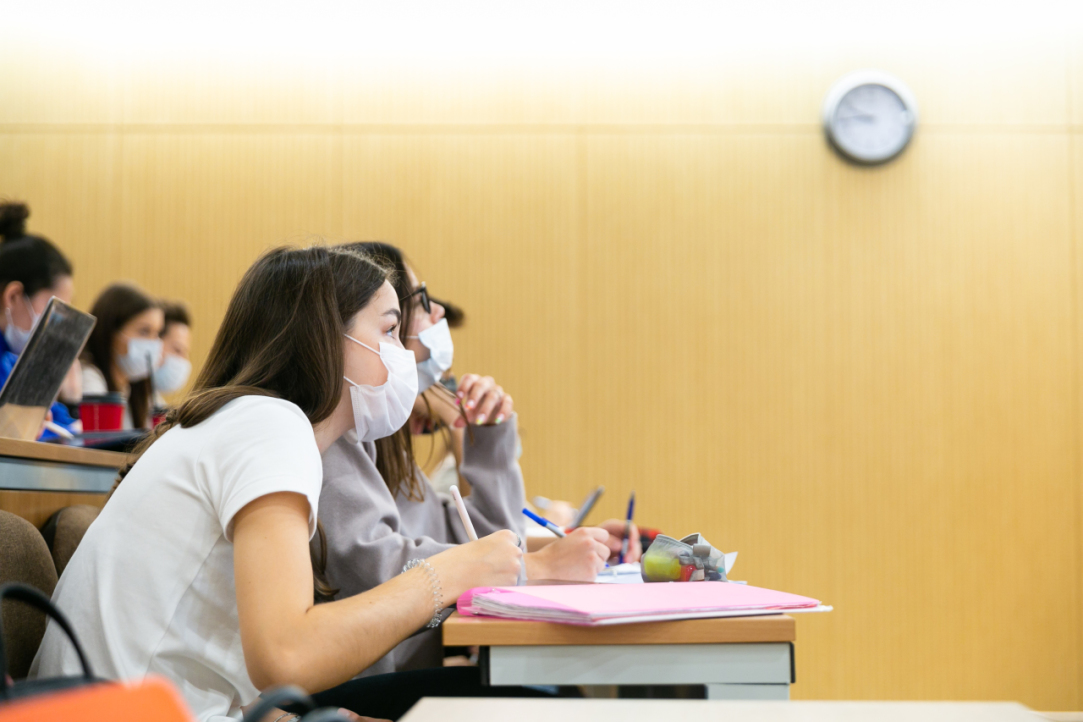Returning to the Classroom: How ICEF Handled the Challenges of Online Learning and What Has Changed

On March 29, HSE is fully transitioning to in-person instruction. However, since March 1 some departments, including ICEF, have been conducting seminars on campus while holding lecture courses online. Oleg Zamkov, Academic Supervisor of the ICEF Bachelor’s programme, spoke about how ICEF survived the rapid transition to online exams, what LSE professors have to say about the effectiveness of the online exams, and what digital innovations that were implemented during the remote period will be used moving forward.
Why We Are Returning Earlier
Throughout this year at ICEF, we conducted student surveys and questionnaires, consulted with the student council, and collected valuable feedback, which we used in order to make adjustments to the educational process and make it as convenient as possible. Students assessed the disadvantages as well as the advantages of remote learning. Student feedback served as the basis for measures we implemented to improve the quality and efficiency of conducting classes and exams online.
This week ICEF started conducting seminar courses for first-year and second-year students not remotely but on campus. We are doing this primarily to provide an environment for our students in which to develop their social skills. An important issue in teaching at the first- and second-year levels is the development of critical thinking and their worldview. This happens, as a rule, in the format of personal communication, teamwork, and direct social interaction. At the beginning of a student’s university education, the development of personal qualities lays the foundation for the development of flexible skills in the future. For example, in the third and fourth years of study, students are more organized, they have had sufficient experience with communicating in different formats and, judging by the surveys, they can cope with learning online without detriment to their social skills. For them, we are extending remote learning until the campus-wide return to in-person learning.

Why are seminars in particular held in person? In our opinion, it is the seminars that are important to conduct in person to help students further develop their communication skills. This is confirmed by the student surveys we conducted. Students said that seminars are really more convenient to attend in person. While classes are held two days a week for each of the newer cohorts, we left the remaining days for online lectures, since our survey results showed that holding lectures online was most effective.
The spring session exams will be administered in person. However, some students will still take them online. These are international students from countries with which flights have not yet been resumed, as well as students in quarantine. Despite having to study remotely, many of them are doing a wonderful job in the programme and performing brilliantly on the exams, which are administered online with proctoring.
Takeaways from Remote Learning
Although the transition to online instruction was extreme, in December 2020 ICEF became the only HSE division that managed to fully organize proctored online final exams in December without any troubles.
Together with the LSE, we analyzed student performance in the exam session in detail and came to the conclusion that moving the educational process online did not cause stress for ICEF
The LSE professors of the International Academic Council, which met in February 2021, lauded the organization of our online exam session. Everyone involved in the educational process, despite the extremely short timeframe in which everything had to be moved online, handled the challenges successfully, as evidenced by the performance assessments of the autumn and winter sessions of 2020.
For example, first-year ICEF undergraduate students took six exams administered with Examus asynchronous proctoring. These included an international exam with the participation of an external examiner for the course ‘Macroeconomics’, since it is designed for one semester. The students performed at levels comparable to previous years. In general, the average scores earned corresponded to those of 2018 and 2019. As for high grades, their number slightly decreased for all courses, but the share of low grades also decreased for most courses.
Exams
Interestingly, in October 2020, exams were held in person, while students who were in quarantine or abroad (about 5-10% of students) took exams online with Examus proctoring.
In contrast to the October session, all 57 ICEF exams in December were organized online with proctoring — they were held synchronously for Master’s students and asynchronously for Bachelor’s students. Several exams used the synchronization of Examus with Google Docs, Moodle, the ICEF information system, Canvas, and Gradescope applications, which helped improve the process.
ICEF, like other faculties, independently determined how to conduct our exam session. As a result, the exams were prepared and conducted very well, as evidenced by the high correspondence in student performance levels between this year and previous years. In particular, the range of students grades across subjects and within each subject has decreased, which in fact is a positive result.
The Challenge of Self-Organization
Student survey results showed that the main problem for students was being able to effectively manage their time while studying online. When transitioning to online learning, it was more difficult to remain motivated and self-disciplined. Thus, the need arose for instructors to provide personal support through communication via messenger apps, which helped reduce student anxiety. Students ended up requiring more opportunities for social interaction while studying online, such as small group assignments as well as individual assignments. The teachers took this difficulty with online independent work into account and began using various communication channels, both on social media and within the ICEF information system as well as the platforms where the classes were held. These forms of communication persist even now as we return to in-person classes.
The format of exam questions and the time at which the exams were held were the same for all subjects. For each exam, an online administrative and technical support team was available; in difficult cases, some students were transferred to Zoom and received technical assistance. Sometimes it was necessary for students to update the software on their personal devices — this issue was discussed and determined in advance. One exam was postponed due to suspicions of a hacker attack but was administered without a hitch on the appointed day.
Isolated cases of cheating were recorded, but they were discovered in time. In general, this did not affect the score level and correlation with the results of offline exams in previous years.
What Innovations Will Continue to Be Used After Returning to Campus
The lecture recording option was introduced at HSE urgently in order to ensure effective instruction online. However, student surveys have shown that recording lectures has proven to be a very useful option and a valuable resource that can be used effectively for independent study. We are recording the seminars in part for now — nevertheless, they constitute important files in the ICEF digital archives and will serve to further improve work at the intersection of technologies and traditional educational practices. This academic year we will continue to record lectures and upload them to the information system where they can be accessed by students. This will also allow us to receive constructive criticism and feedback from users.
The best lecture format, in the opinion of students and teachers, was lecturing in the auditorium while recording and broadcasting it for students at home. This format was widely implemented in the first module. This way we satisfy the needs of those who are comfortable listening to lectures on site, and those who, for one reason or another, prefer to connect online.

Dr Jörn Rothe, ICEF Project Manager at LSE
I believe that ICEF coped with the online exam sessions much more successfully than many universities I know, so in the coming exam session we expect to get the same objectivity as in the previous online and offline exams.
Despite the return to in-person instruction, we will retain the format of online exams using proctoring and Examus. It fully justified itself and in the future can be used in order to assess students remotely in the event that they are ill or are studying abroad.
Oleg O. Zamkov
ICEF Deputy Director
Natalia Koliadina
Visiting Lecturer, ICEF
Fabian Slonimczyk
Associate Professor, ICEF
See also:
HSE Biologists Explain Mechanism behind Coronavirus Evolution
A team of researchers, including scientists of the HSE Faculty of Biology and Biotechnology, have analysed the evolutionary path of the coronavirus from the Wuhan variant to Omicron. Their findings indicate that many genomic mutations in SARS-CoV-2 are shaped by processes occurring in the intestines and lungs, where the virus acquires the ability to evade the inhibitory effects of microRNA molecules. The study findings have been published in the Journal of Medical Virology.
Russian Researchers Explain Origins of Dangerous Coronavirus Variants
HSE researchers, in collaboration with their colleagues from Skoltech and the Central Research Institute for Epidemiology, have uncovered the mechanisms behind the emergence of new and dangerous coronavirus variants, such as Alpha, Delta, Omicron, and others. They have discovered that the likelihood of a substitution occurring at a specific site of the SARS-CoV-2 genome is dependent on concordant substitutions occurring at other sites. This explains why new and more contagious variants of the virus can emerge unexpectedly and differ significantly from those that were previously circulating. The study’s findings have been published in eLife.
HSE Biologists Prepare Strategy for Universal COVID Test
Russian researchers have developed a strategy to create a cheap and rapid COVID-19 test based on isothermal amplification. According to their publication in Applied Biochemistry and Microbiology, use of this strategy will make it possible to create universal test systems for any of the COVID-19 variants.
People’s Values Affect Their Attitudes to COVID-19 Restrictions
HSE social and political analysts have established which value models and circumstances promote support for restrictive government policies aimed at combatting the coronavirus pandemic. The research is published in Plos One.
Model of Predator-Prey Relationship Helps Predict Spread of COVID-19
Researchers from the HSE Faculty of Economic Sciences have proposed a mathematical model that describes the course of the COVID-19 pandemic, taking into account the restrictions applied in different countries. The model will help governments make reasonable and timely decisions on introducing or lifting restrictions. The paper was published in Eurasian Economic Review.
HSE University Classes to Be Held On Site for All Students
Classes in the new academic year will take place on site for students of all HSE University campuses. Existing COVID safety precautions will remain in effect.
Russian Scientists Investigate the Immune Response to SARS-CoV-2 Variants
HSE University researchers assessed the effectiveness of the T-cell immune response to 11 variants of SARS-CoV-2. Their findings have been published in Nucleic Acids Research.
First-year Students Will Be Able to Get COVID Shots at HSE University
The new regulations ‘On the Organization of Studies for the 2021/2022 Academic Year’ feature in detail what will change for first-year students in the new academic year. HSE University will be organizing a vaccination drive in September for students aged 18 and over who are unvaccinated. Younger students will be eligible for vaccination once they turn 18.
New Safety Measures to Be Introduced at HSE University
Starting September 1, 2021, HSE University-Moscow is introducing new safety policies on campus to prevent the spread of COVID-19. They apply to students over 18 years old who have not had COVID during the last six months, have not been vaccinated (with a Russian or a foreign vaccine), nor have a medical exemption from vaccination. Free vaccination will be available on campus to all arriving students.
HSE University Creates the Viral Genealogy Simulator to Model the Spread of COVID-19
Researchers of HSE Tikhonov Moscow Institute of Electronics and Mathematics (MIEM), in cooperation with their colleagues from the University of California, Santa Cruz (UCSC), and The European Bioinformatics Institute (EMBL-EBI), have developed software to model the spread of the COVID-19 global pandemic. This is the world’s fastest Viral Genealogy Simulator (VGsim). For more details about this scalable simulator, read the reprint on medRxiv. The code is freely available at GitHub.


